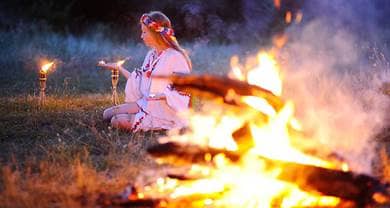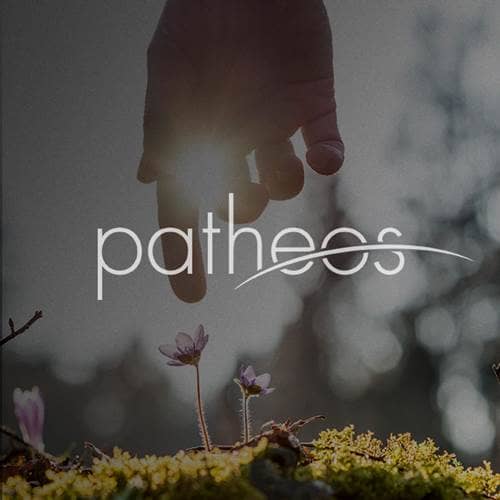- Trending:
- Pope Leo Xiv
- |
- Israel
- |
- Trump
- |
- Social Justice
- |
- Peace
- |
- Love

RELIGION LIBRARY
Paganism
Founders
Paganism has no overall founding figure (such as Krishna, the Buddha, Jesus Christ, or Muhammad) who functions as an object of worship or veneration. Because ancient Paganism is prehistoric in origin, key figures from the beginnings of this religious path are lost to the mists of time. However, various traditions and lineages within the Pagan world can be traced to one or more key visionaries or leaders who founded (or popularized) his or her particular community. It would be inaccurate, however, to see any one of these figures as a "founder" for the overall nature religion community.
An example for this would be Gerald Gardner (1884-1964), the British author whose books Witchcraft Today (1954) and The Meaning of Witchcraft (1959), as well as his ritual writings, are largely credited with the creation-or rebirth-of British witchcraft (also known as Wicca). Gardner himself maintained that he was initiated into a pre-existing secret community of witches who were practicing a Pagan religion (and not devil-worship); others insist that Wicca as it exists today is largely the creation of Gardner and his associates. That said, many groups of witches and Wiccans pay no allegiance to Gardner at all; furthermore, among other Pagans such as Druids, Celtic Reconstructionists, Odinists, devotees to Hellenic or Egyptian deities, and other practitioners who do not identify as Wiccans or witches, Gardner has little or no influence.
With this caveat in mind, Paganism, like any spiritual tradition, has numerous contributors who have shaped the many forms that it takes today. The following list of individuals represent a sampling of some of the many writers, teachers, and practitioners who are renowned for their impact on the continuing development of the overall modern Pagan movement. These individuals represent a variety of specific nature-based, polytheistic, and goddess-oriented spiritual traditions, including Gardnerian Wicca, Alexandrian Wicca, Dianic witchcraft, contemporary Druidism, core shamanism, and Norse religion.
Alexander Rud Mills (1885-1964) founded the First Anglecyn Church of Odin in Australia in 1936, a forerunner of the 20th-century revival of Norse paganism. Although today his religious vision is seen as too heavily influenced by Christianity, he is regarded as a contributor to later, more authentic, expressions of Heathenry. Mills is the author of The Odinist Religion (1939) and The Call of Our Ancient Nordic Religion (1957).
Ross Nichols (1902-1972) founded the Order of Bards, Ovates and Druids in 1964, which (unlike previous Druid revivalist groups) began to incorporate more explicitly pagan elements into the group's practice, including an emphasis on Celtic mythology. He developed the eight-festival calendar that was adopted by various other Pagans. An anthology of his writings was published posthumously as The Book of Druidry (1975).
Doreen Valiente (1922-1999) was one of several women who functioned as a High Priestess with Gerald Gardner; she also participated in another influential coven in the 1960s, the Clan of Tubal Cain. By the 1970s Valiente was renowned as a leading writer on traditional witchcraft. She is now widely credited as authoring or co-authoring with Gardner the Charge of the Goddess, one of the most popular Wiccan ritual texts.
Carlos Castaneda (1925-1998) authored several controversial books that describe his alleged studies with Don Juan, a Yaqui "shaman." Despite that fact that the authenticity of Castaneda's writings are contested, his books have sold over eight million copies and helped to create a popular understanding of the "shaman" as an indigenous spiritual elder who can initiate others into the spiritual mysteries of nature.
Alex Sanders (1926-1988) established his own lineage of Wicca, the Alexandrian Tradition, which incorporated more elements of ceremonial magic into its rituals than Gardnerian witchcraft. A leading public witch in London in the 1960s, Sanders initiated several influential figures into the craft, including the writers Janet and Stewart Farrar.
Michael Harner (b. 1929) founded the Foundation for Shamanic Studies, an institution that teaches "core shamanism," a distillation of general principles of indigenous magico-religious spirituality from tribal cultures around the world. He is the author of The Way of the Shaman (1980), detailing his own experiences with tribal spiritual elders in the Amazon rainforest.
Zsuzsanna Budapest (b. 1940) was one of six women who founded the Susan B. Anthony Coven in 1971, now generally regarded as the birth of feminist or Dianic witchcraft (after the Greek Goddess Diana). Budapest has written numerous books on witchcraft and feminist spirituality, notably The Feminist Book of Lights and Shadows (1975) and The Holy Book of Women's Mysteries (1989).
Isaac Bonewits (1949-2010) established a Pagan Druid organization, Ár nDraíocht Féin: A Druid Fellowship (ADF), which promotes a more scholarly approach to Paganism (and which accepts all varieties of Indo-European Paganism, not just Celtic Druidism). He authored several books, most notably Real Magic (1972).
Starhawk (Miriam Simos) (b. 1951) is the author of the highly influential book The Spiral Dance: A Rebirth of the Ancient Religion of the Great Goddess (1979) and the founder of the Reclaiming Coven in San Francisco. Starhawk articulated both the political as well as the spiritual implications of witchcraft in her writing, and is as well known for her political activism as her religious authority.
Edred Thorsson (pen name of Stephen Flowers) (b. 1953) is a leading writer of books on the spirituality of the Runes and the religion of the ancient Norse. His books include Futhark: A Handbook of Rune Magic (1984) and A Book of Troth (1989).
This list is partial, incomplete, and is not intended to be comprehensive or universal. Because most forms of Paganism are decentralized and emphasize personal spiritual experience rather than religious dogma or doctrines, founding figures play a much smaller role in most Pagan paths than do the founders of other religious traditions.
Study Questions:
1. Why is there no single founder of Paganism?
2. Describe the contribution of three recognized leaders in the creation of Paganism.
3. What can be said about the relationship between the role of leadership within Paganism and gender?










